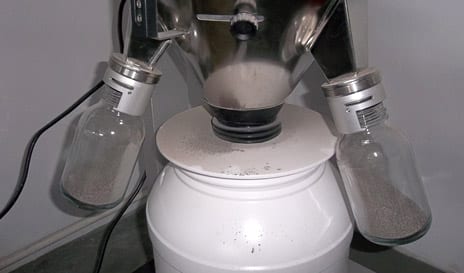While many people know that catalytic converters are expensive and have great scrap value, few people understand why this is so.
Catalytic converters are highly sought after largely because of the three valuable metals they contain: platinum, palladium, and rhodium.
These metals are the reason for the high cost of buying catalytic converters as well as the motivation for recycling them.
We’re going to learn more about the importance of recycling catalytic converters. Before that, however, let’s take a deeper look at the three metals and other components of a catalytic converter.

Components of A Catalytic Converter
Converters are composed of three main metals and other materials, as outlined below:
- Platinum
Platinum serves as a reduction catalyst as well as an oxidation catalyst. It’s a very active catalyst and is normally used as a metal that helps neutralize the toxic fumes coming from the vehicle’s engine to neutralize the adverse effect on the environment. It’s worth noting that platinum is very expensive.
- Palladium
Palladium serves as an oxidation catalyst. It’s usually more expensive thanplatinum and, therefore, tends to be a premium luxury item for converters.
- Rhodium
Rhodium serves as a reduction catalyst. It helps eliminate the fumes. When combined with palladium, it becomes effective in eliminating toxic substances.
- Metal or Ceramic Foil
This is the visible component of a catalytic converter. The honeycomb-like pattern that you see throughout the converter has all those openings to ensure that toxic substances in exhaust fumesare collected as they pass over this section.
- Metal Shield
These are exterior components thatare generally made of stainless steel or an ordinary 303/304 stainless steel case.
Why It’s Important to Recycle a Catalytic Converter?
While converters have multiplenegative effects on the environment, extracting precious metal ores from the earth is also a cost-intensive and challenging endeavor. Platinum ore, for example, is hauled out of tunnels that require an incredibly vast amount of energy to dig.
Moreover, to produce just an ounce of platinum metal, you’ll need a ton of platinum ore. You’ll have to treat the ore with chemicalsto extract the platinum successfully.
The entire process of transforming platinum from its raw form to the precious metal we admire causes a great deal of pollution. The conditions under which the poorly paid platinum miners work are also extremely precarious.
When you recycle your catalytic converter, you help minimize the need to mine precious metals like platinum. This is greatly beneficial for the environment.
How to Recycle A Catalytic Converter?
If you’re thinking of recycling or refining your scrap catalytic converters, you should look for professionals to do the job for you. The process of extracting the precious metals is not only difficult, but also dangerous.
You may manage to extract platinum, rhodium, and palladium from your converters, but you’ll most probably get farfewer amounts than you would if you left the recycling to experienced professionals. It’s worth noting that recycling process varies depending on the technology used.







